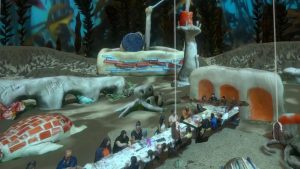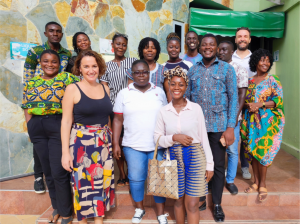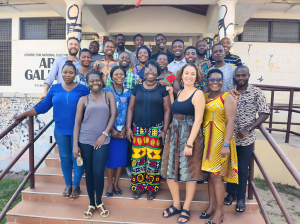Tag Archives: Mellon Foundation
Fisher Child lunches its immersive heritage experience
We are happy to share that TraciKwai’s Fisher Child VR Experience, one of the 75 projects funded by our Small Grants for Africa, an initiative generously supported by the Mellon Foundation, had its official launch on June 21st.
Project Fisher Child is a multidisciplinary storytelling experience that weaves together VR, AR, and QR technologies. Each element offers a unique narrative that intersects and overlaps with the others, creating a rich, immersive journey. Whether you are engaging on-site or from wherever you are, the stories remain accessible and impactful.
The launch event was a great success and was attended by 100 people who gathered at the small community hall in Kalk Bay.The guests came from both the local fishing community and the wider Cape Town area and queued in front of each of the two-by-two marked out squares, patiently waiting for their turn to experience the Virtual Reality, Living Museum of stories and images housed inside a 3D world; a repository of archival material including images, old photographs and the ancient sound of the Poedjies unique to the area.
A multi-sensory experience of sight and sound combined with the flavours and aromas of fresh indigenous food: “viskop sop”, smoor snoek en gebakte brood (fish head soup, fish stew and freshly baked bread) topped with home made preserves and spicy tea.
Community members were brought to tears as they heard the voices of old friends and family members who were no longer there and young voices gave them a sense of hope and pride and belonging.
The VR experience made them feel as though they were immersed under the sea and created feelings of nostalgia and they were able to share those memories with us after.
Age was no barrier. This experience was enjoyed by five year olds and eighty five year olds alike.
The Augmented Reality Museum Jars were also a big success, with quite a few sold on the day. Participants were so engrossed in the experience that many needed gentle encouragement to exit!
All in all a very successful community event!
Experience some of the exhibits yourself here.
HERITΛGE in the News
Our teams are working around the world to fulfill the HERITΛGE mission. Here is how some of our work has been featured in the press in the last few months.
Heritage Threatened by Conflict
HERITΛGE has launched a new project to safeguard Ukraine’s cultural heritage. Architectural Heritage Preservation in Times of War: The Ukrainian Model is being realized in cooperation with the Kharkiv School of Architecture and Skeiron, with generous support from the U.S. Embassy’s Public Diplomacy Section in Ukraine. The project has been featured in the latest issue of Popular Archaeology as well as in Ukrainian media.
HerMaP Gambia
The Gambia’s National Assembly’s Committee for Culture and Tourism recently embarked on a Parliamentary Study Tour in Thessaloniki. This visit, conducted as part of the HerMaP Gambia program co-funded by the European Union, was widely covered in the Gambian media, including prominent news programs and The Voice newspaper.
Watch the QTV bulletin (start at 14:18) or read the article in The Voice.
HERITΛGE also delivered workshops in The Gambia on various aspects of cultural management, including Festival Management, which was covered by The Voice.
African Heritage Grants
HERITΛGE’s small grants for African heritage initiative, supported by the Mellon Foundation, recently funded Restoring Ilukwe House, a project by the NGO Legacy to restore a historic building in Lagos’ railway compound. Coverage of this initiative appeared in Nigeria’s The Guardian.
The Republic, a Nigeria-based magazine and platform of socio-economic and political commentary, criticism and cultural discourse, has received a substantial grant from the Mellon Foundation to support its mission to establish itself as a regional, leading hub/platform for Black and Africa-focused ideas and critical perspectives; and to further connect Africa and the African diaspora on critical issues, with the help of HERITΛGE.
Greek Living Heritage Network
As a founding member of the Living Heritage Network in Greece, HERITΛGE continues to support and celebrate Greece’s living heritage. Theodosia Maroutsi recently discussed the Network on NaMaste, a cultural program on Greece’s national broadcaster ERA2.
Greek speakers can listen to the show here.
26 new recipients of small grants for Africa
 HERITΛGE is very pleased to announce another 26 recipients of our HerMaP Africa small grants for organizations, groups, and individuals working with heritage in Africa. The small grants initiative is generously supported by the Mellon Foundation’s Humanities in Place program.
HERITΛGE is very pleased to announce another 26 recipients of our HerMaP Africa small grants for organizations, groups, and individuals working with heritage in Africa. The small grants initiative is generously supported by the Mellon Foundation’s Humanities in Place program.
In this second round of the program, over $333,000 has been awarded to projects that focus on the protection and promotion of local cultural and natural heritage and aim to contribute to the socio-economic development of local communities and beyond. HERITΛGE disbursed over $220,000 to 19 heritage projects in the first round of the small grants initiative earlier this year. By the end of 2024, a total of $1 million will have been awarded in small grants to African heritage projects.
“We are extremely pleased to announce this second round of small grant awards for African projects. We are already seeing what the scheme is doing to unlock the potential of heritage in Africa and make a difference for the development of local communities through the work undertaken by the first 19 grantees,” said HERITΛGE Director, Dr. Evangelos Kyriakidis. “Heritage has the ability to empower and we are already seeing local communities using our grants, in partnership with local organizations, to support sustainable development and safeguard local heritage for generations to come.”
The list of newly approved grants includes heritage projects from Algeria, Benin, Burkina Faso, Cameroon, the Democratic Republic of Congo, Ethiopia, The Gambia, Ghana, Kenya, Niger, Nigeria, South Africa, Sudan, Tanzania, Togo, Uganda, and Zambia.
To receive a small grant from the HerMaP Africa program, applicants have to demonstrate that their project has a lasting impact, develops capacity, builds networks, strengthens local skills, and has a strong, measurable impact for the protection of heritage and the benefit of local people.
A full list of the projects that have been awarded small grants can be found here.
Applications are still being accepted for the next round of small grants for heritage projects. To find out more and apply, visit our website: https://heritagemanagement.org/
About HerMaP-Africa: Made possible by a $5 million grant from the Mellon Foundation’s Humanities in Place program, HerMaP Africa aims to strengthen HERITΛGE’s Africa programs, fund initiatives that link heritage with socio-economic impact, develop the capacity of local organizations, and help them preserve African heritage and culture.
About The Andrew W. Mellon Foundation: The Andrew W. Mellon Foundation is the largest supporter of the arts and humanities in the United States. Since 1969, the Foundation has been guided by its core belief that the humanities and arts are essential to human understanding. The Foundation believes that the arts and humanities are where we express our complex humanity and that everyone deserves the beauty, transcendence, and freedom that can be found there. Through its grants, it seeks to build just communities enriched by meaning and empowered by critical thinking, where ideas and imagination can thrive. Learn more at mellon.org
2023- 2024: Our academic year in review
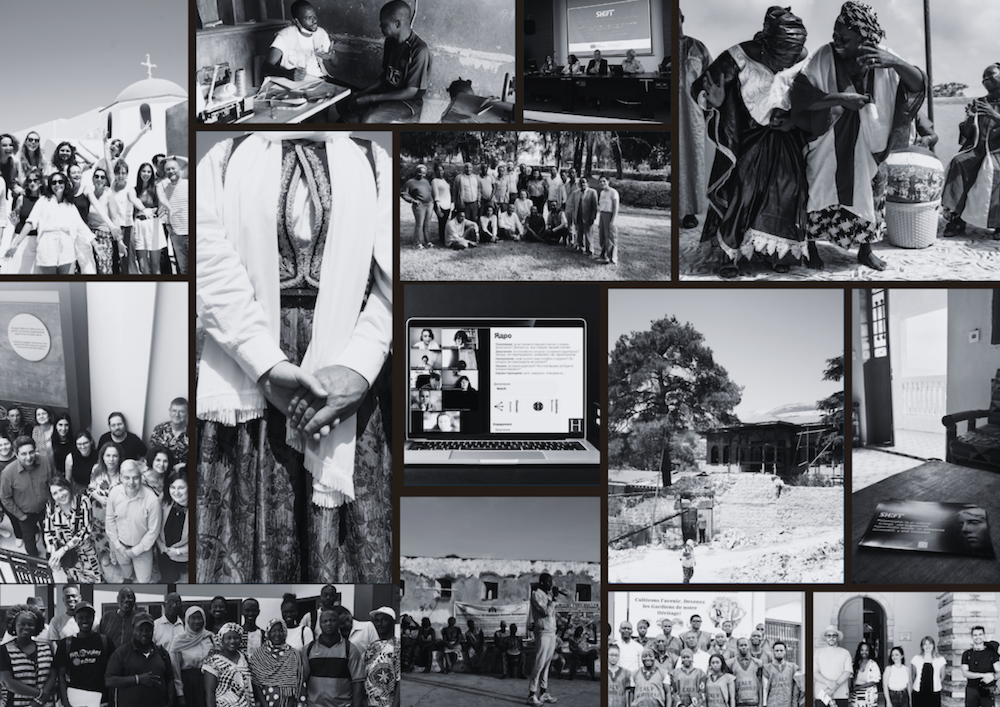 On Saturday, June 30th, the HERITΛGE team wrapped up the 2023-2024 academic year with an event on the Greek island of Paros island to mark the end of our Community Engagement for Cultural Heritage Summer Field School. The event was the culmination of possibly the most successful academic year since the organization was founded 15 years ago.
On Saturday, June 30th, the HERITΛGE team wrapped up the 2023-2024 academic year with an event on the Greek island of Paros island to mark the end of our Community Engagement for Cultural Heritage Summer Field School. The event was the culmination of possibly the most successful academic year since the organization was founded 15 years ago.
During the last 12 months, HERITΛGE completed 40 training activities that included online and in-person workshops, two hybrid summer schools, and an academic Certificate program bearing ECTS credits, delivered in cooperation with HOGENT University in Belgium. Over 650 heritage managers and caretakers were trained in managing heritage assets, independent of project specifics.
We expanded our curriculum with a new conservation course, First Aid for Finds. The 3-day online workshop complements the Introduction to the General Principles of Cultural Heritage Conservation workshop we introduced in the academic year 2022-2023. In the past year, we also ran two successful pilot programs in Interpreting Heritage and Engaging Communities for Climate Change and in Community and Economic Development, focusing on community-based tourism. Both will form part of our 2024-2025 academic year training offerings.
We also expanded our partnership with the Mellon Foundation through our HerMaP Africa program, funded by the Foundation’s Humanities in Place initiative. Through HerMaP Africa we have already awarded 60 grants and 60 fellowships to heritage organizations and professionals across Africa. Through HerMaP Gambia, a program co-funded by the European Union, we continued to work to strengthen The Gambia’s heritage sector in order to contribute to the creation of more and better jobs for the country.
Thanks to the British Council, our project in Pakistan on the protection of Buddhist rock carvings in Swat (in partnership with the Italian Mission and EssaNoor Associates) has gotten off the ground. Our J.M. Kaplan Fund work in Iraq has been completed and so has our Creative Europe project in Ukraine, training heritage managers in digital storytelling for Ukrainian Museums – together with Ukrainian partners. Our cooperation with Aliph and local partners enabled us to contribute to the efforts to safeguard local heritage in the aftermath of last year’s catastrophic earthquakes in Turkey and Syria. This academic year we also helped create the Living Heritage Network which aims to bring together and empower all organizations and individuals working with Greek living heritage.
Meanwhile, we continued working with some of Europe’s best-known academic and research institutions as well as heritage organizations and private businesses to make cultural heritage more accessible and inclusive through SHIFT, a project funded by the European Union’s Horizon Europe program.
Finally, earlier in 2024 we started working on AHEAD, another Creative Europe program, this time aiming to strengthen European cultural heritage institutions’ audience development efforts.
These are most but by no means all the projects our team is working on, all the while expanding HERITΛGE’s impact and outreach efforts. Stay tuned for more!
19 African heritage projects receive small grants
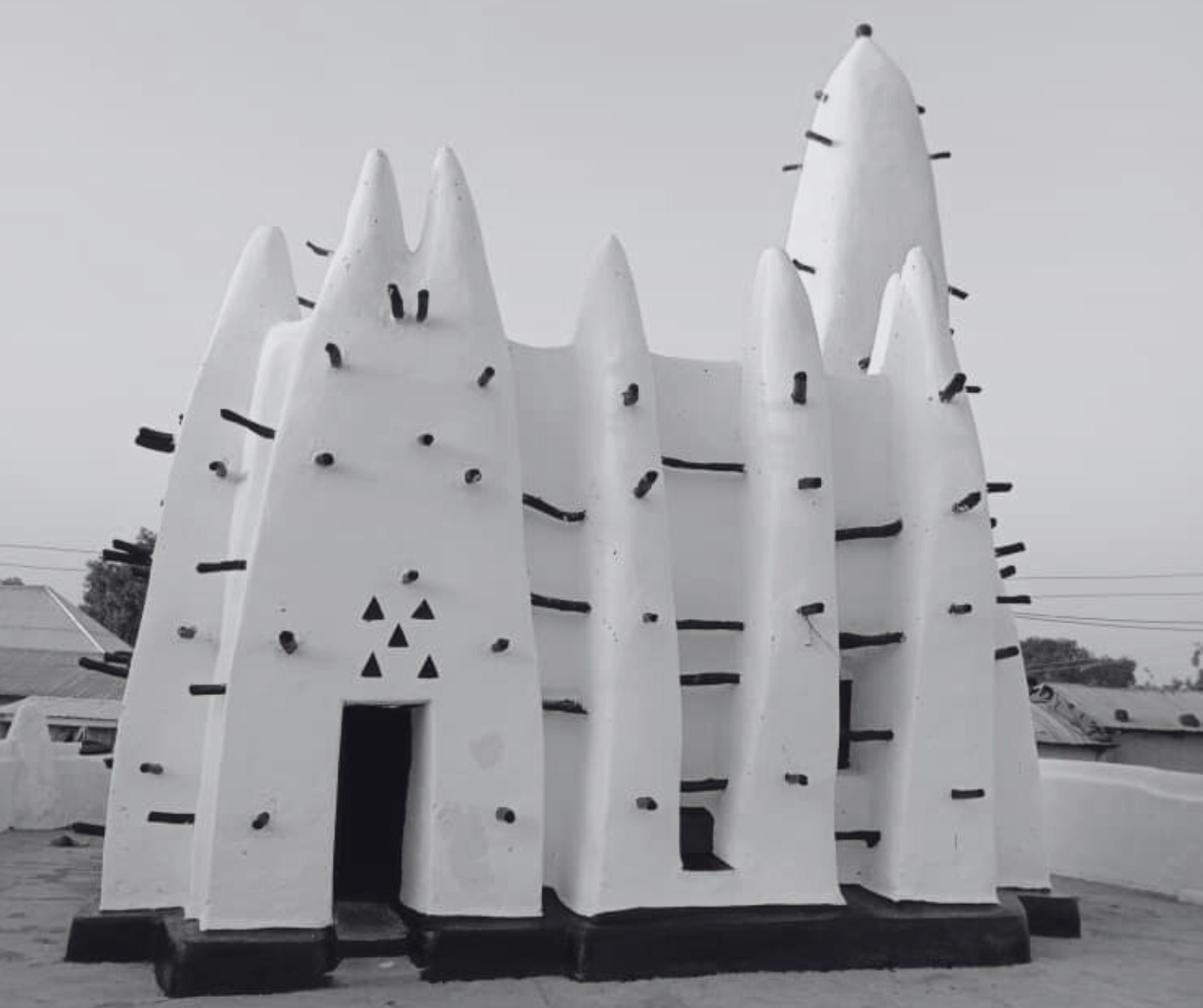
The Nakore Mosque in Northern Ghana is one of the three mosques being restored with funding from our HerMaP Africa grants
The Heritage Management Organization (HERITΛGE) is pleased to announce the first 19 recipients of its HerMaP Africa small grants for organizations, groups, and individuals working with heritage in Africa. The HerMaP Africa initiative is generously supported by the Mellon Foundation’s Humanities in Place program.
In the first round, over $220,000 has been awarded to projects that focus on the protection and promotion of local cultural and natural heritage and aim to contribute to the socio-economic development of local communities and beyond. By the end of 2024, $1 million will have been awarded in small grants to African heritage projects.
“These grants aim to unlock the potential of heritage in Africa and make a difference for the development of local communities,” said HERITΛGE Director, Dr. Evangelos Kyriakidis. “Heritage has the ability to empower, and we are confident that in partnership with local organizations, we can help create sustainable development and safeguard local heritage for generations to come.”
To receive a small grant from the HerMaP Africa program, applicants have to demonstrate that their project has a lasting impact, develops capacity, builds networks, strengthens local skills, and has a strong, measurable impact for the protection of heritage and the benefit of local people.
“We are already seeing the effect the grant is having in transforming these valuable heritage resources for the community,” says Dr. Mahmoud Malik Saako of the Ghana Museum and Monuments Board, an assistant director of museums and project manager of the Islamic Heritage in northern Ghana, one of the first projects to receive a grant. The project aims to restore three old mosques, products of the long-distance trade networks that once existed in Northern Ghana. Located along the old trade routes, there are ten remaining mosques in the region, all facing challenges posed by modernization, arabization, and climate change.
“The mosques are tangible evidence of the material culture and history of northern Ghana and are part of the valuable heritage resources of local communities. The communities realize the need to restore them as part of their culture and history and to develop ecotourism around them. Their preservation will go a long way to pave the way for their eventual inscription onto the World Monuments List,” adds Dr. Mahmoud.
A full list of the projects that have been awarded small grants can be found here.
Applications are still being accepted for the third round of small grants for heritage projects. Find out more and apply here.
About HerMaP-Africa: Made possible by a $5 million grant from the Mellon Foundation’s Humanities in Place program, HerMaP Africa aims to strengthen HERITΛGE’s Africa programs, fund initiatives that link heritage with socio-economic impact, develop the capacity of local organizations, and help them preserve African heritage and culture.
About The Andrew W. Mellon Foundation: The Mellon Foundation is the largest supporter of the arts and humanities in the United States. Since 1969, the Foundation has been guided by its core belief that the humanities and arts are essential to human understanding. The Foundation believes that the arts and humanities are where we express our complex humanity and that everyone deserves the beauty, transcendence, and freedom that can be found there. Through its grants, it seeks to build just communities enriched by meaning and empowered by critical thinking, where ideas and imagination can thrive. Learn more at mellon.org.
Empowering Heritage Practitioners in Ghana: Insights from Workshops in Winneba and Accra
In December 2023, two landmark community engagement in cultural heritage workshops took place in Winneba and Accra, Ghana, bringing together dedicated heritage managers from various regions. These workshops, part of HERITΛGE’s HerMaP Africa program and supported by the Mellon Foundation’s Humanities in Place program, aimed to equip participants with the tools and insights to actively engage communities, navigate cultural complexities, and delve into the rich tapestry of oral history.
The Accra workshop began on Wednesday 6th December with interactive presentations to 22 attendees by Dr. Aris Anagnostopoulos, Dr. Lena Stefanou and HERITΛGE director, Dr. Evangelos Kyriakidis. On day two (Thursday 7th) attendees had the chance to explore heritage projects close to their hearts and present in small groups on how they might stimulate local engagement. The projects presented included the Mystic Ayi Tree, traditional Ghanian fabrics, oral storytelling traditions and the history of the famous priest Okonfo Anokye. The final day (Friday 8th) was dedicated exclusively to exploring oral history in heritage contexts. The theories and techniques of preserving oral history were presented to the participants and they were later asked to conduct mock interviews about one group member’s childhood. Following on from this, each group produced an interview report which would help guide them in future oral history research.
The following week the same workshop was conducted in Winneba from Monday 11th-Wednesday 13th December. Although this workshop involved fewer participants (up to 18 on the final day a broad range of heritage ideas and projects were explored. The group exercise, this time conducted on day 1, produced ideas about promoting tourism through sculptural monuments in Efutu region, promoting widow’s rights in the Deogo communities and a “reclaiming our roots” festival. The discussions were lively and raised some crucial ethical questions about how a heritage practitioner should involve his or herself in cultural practices. On day two we introduced a new “Who are your Communities” exercise in which participants identified and presented their community and its values. The final day, as in Accra, confronted oral history in heritage contexts. Once again it was very encouraging to hear such a diversity of approaches, questions and opinions and each group produced a helpful report to take away.
All in all, we are very excited about how the workshop went and look forward to the potential for future expansion into other areas of Ghana.

